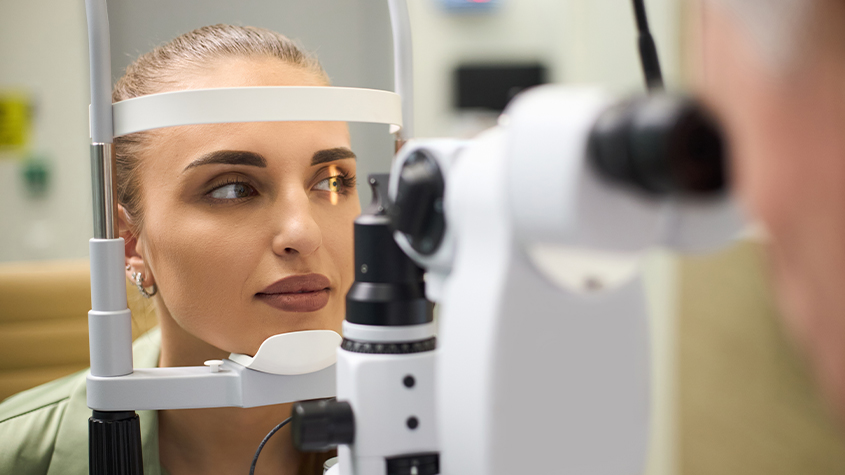What To Expect

What to Expect During Your Eye Exam
At Lakeway Eye Center, your eye exam is more than just updating a prescription for glasses or contact lenses—it’s a comprehensive health check for your eyes. Many eye conditions develop without symptoms in the early stages, which is why a thorough exam is so important. We screen for eye diseases such as glaucoma, macular degeneration, and diabetic retinopathy, as well as systemic health conditions like high blood pressure and diabetes that can first appear in the eyes.
Step-by-Step: Your Visit
1. Check-in & Health History
Your exam begins with a review of your health history, medications, and any vision concerns you may have. Because the eyes are often a window into your overall health, this step helps us tailor your exam and spot any systemic connections.
2. Vision Testing & Refraction
We measure how clearly you see at different distances and determine whether you need glasses or contact lenses. This process, called refraction, fine-tunes your prescription for the clearest possible vision.
3. Eye Pressure & Front-of-Eye Evaluation
We measure your eye pressure with a quick, non-invasive test and perform a slit-lamp exam to evaluate the health of your cornea, lens, eyelids, and tear film. This allows us to assess for conditions such as dry eye, corneal diseases, and cataracts, which are common causes of vision changes and discomfort.
4. Retinal Health Check & Optomap® Imaging
The retina—the light-sensitive tissue at the back of your eye—provides critical information about your vision and overall health. During your exam, we thoroughly evaluate the retina, macula, and optic nerve to detect early changes from conditions like glaucoma, diabetic retinopathy, retinal tears, and macular degeneration.
To enhance this evaluation, we use Optomap® Ultra-Widefield Imaging, an advanced technology that captures up to 80% of the retina in a single panoramic image. This quick, comfortable test often reduces the need for dilating drops and provides a baseline image to track changes over time.
Benefits of Optomap imaging include
A panoramic view of up to ~200° of the retina
Fast, non-invasive, and comfortable
Early detection of serious eye conditions
Permanent images for side-by-side comparisons at future visits
Cost: Optomap is offered as a $39 copay add-on (insurance coverage varies). We’ll always review your benefits and out-of-pocket costs before imaging.
5. Doctor Review & Care Plan
At the end of your exam, we review your results together. You’ll have the opportunity to ask questions, and we’ll outline next steps—whether that’s updating your glasses, monitoring eye health, or coordinating care with other specialists if needed.
What to Bring to Your Appointment
A photo ID and insurance card (vision and medical)
Your current glasses, contact lenses, or old prescriptions
A list of your medications and relevant medical history
Any questions or concerns you’d like to discuss with the doctor
How Long Does It Take?
A full comprehensive eye exam usually takes about 45–60 minutes. If dilation is needed, it may add an additional 20–30 minutes. Optomap imaging, on the other hand, takes only seconds.
Exams for Children & First-Time Patients
For children, we make exams fun and age-appropriate to ensure a positive experience. If your child is nervous, let us know—we take extra time to explain each step and make them comfortable. First-time patients can expect a thorough but welcoming visit designed to answer all their questions.
Frequently Asked Questions
Do I still need dilation if I get Optomap?
In many cases, Optomap reduces the need for dilation, but certain conditions—such as diabetes, high myopia, or new retinal symptoms—may still require it for the most complete view.
Is Optomap safe?
Yes. The test is completely non-invasive and uses safe, low-energy light to capture images of your retina.
Why is the eye health portion of the exam so important?
Many eye diseases start without symptoms. By examining the retina, macula, and optic nerve, we can detect problems early—when they’re most treatable. Sometimes, eye exams even reveal undiagnosed systemic issues like hypertension or diabetes.
How much does Optomap cost?
Optomap is available at our office for a $39 copay when not covered by insurance. We’ll confirm coverage and costs before the test.
Can I drive after my exam?
If your exam requires dilation, you may experience light sensitivity and blurry near vision for a few hours. Optomap alone does not affect driving. We recommend bringing sunglasses just in case.
At what age should people have eye exams?
Eye exams are important at every age. Children should be examined regularly to ensure proper visual development. Adults benefit from annual exams to protect both vision and overall health.
Book Your Eye Exam
Protect your vision and your health by scheduling a comprehensive eye exam today.
Book Online at Lakeway Eye Center »



